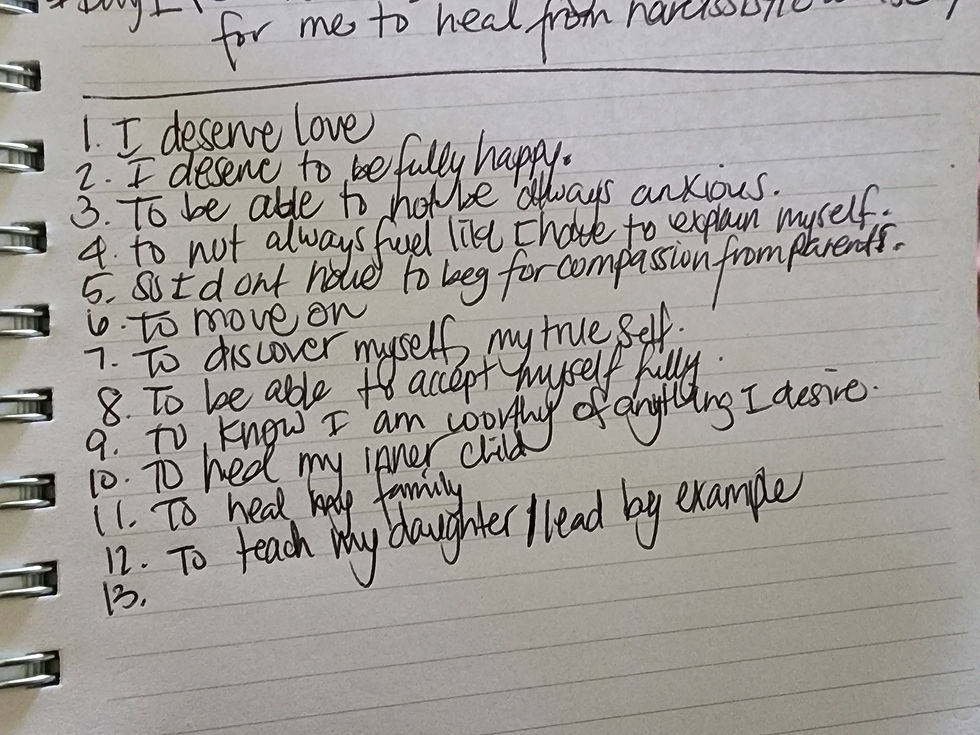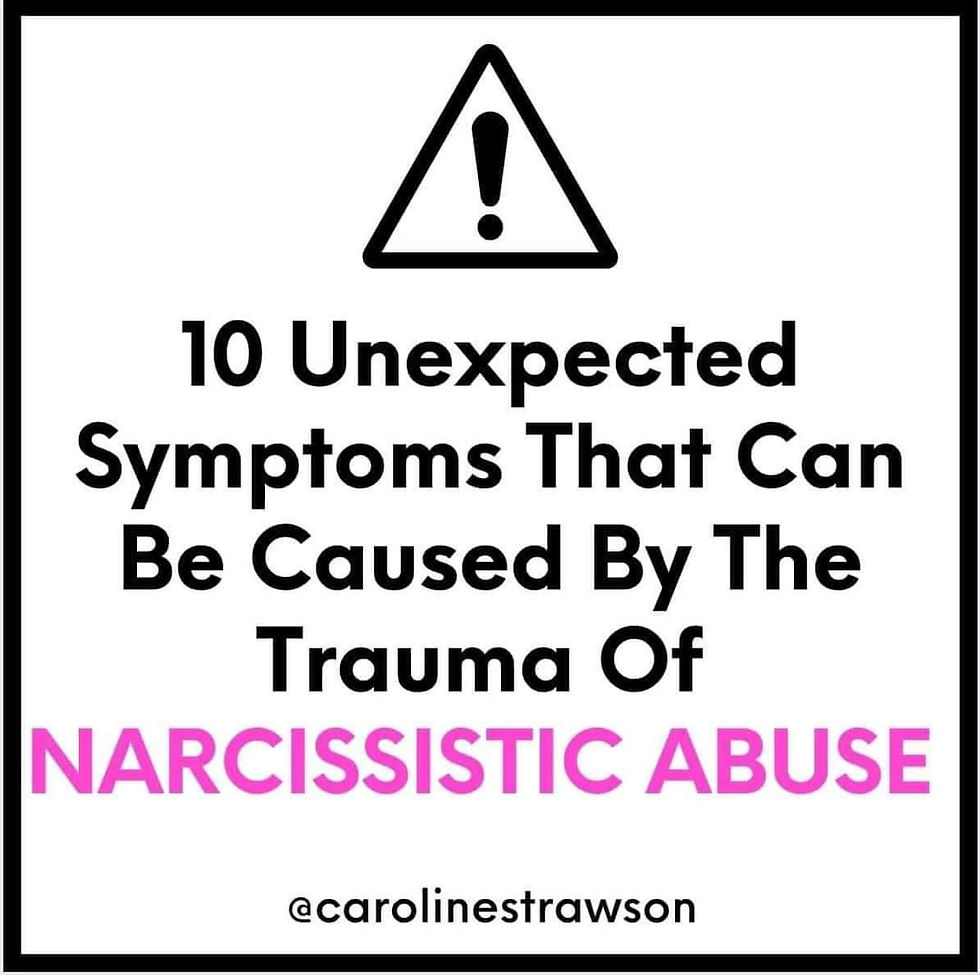Unexpected symptoms of Narcissistic Trauma & Complex PTSD
- jasminessteiner
- Jan 9, 2023
- 5 min read
Happy Monday lovely people ❤️ I have to share , I am proud of myself 😭😭🥰🥰🙏🔥⚔️ I have FINALLY STOOD UP FOR MYSELF IN A WAY I SHOULD HAVE , MANY MOONS AGO, and I TRULY hope this same feeling, of accomplishment and self -Love) for you as well.

Im not sure how long you personally have been a reader of my blog ( www.c-ptsdandme.com ✔️ please subscribe today, engage, start a forum, or send me a guest blog entry at cptsdandme.wttc@google.com also), but things get very personal in here as we witness the live in real time , C-PTSD healing journey of a local island girl that is finally learning about hers of for the first time in 34 years . You will see a lot of posts that are basically just me venting and getting my daily frustrations out (that's literally how I cope with my emotions and my frantic brain that gets crazy during episodes , I have to get it out somehow, and writing/blogging is that outlet. I don't have people in person to talk to.)
t more importantly, we will have daily, #resources and #medical #articles posted pertaining to #CPTSD , and mental health and wellness in general , plus we will (hopefully soon ) have a very active #community forum section . I have started this up in the forum area , and there also is a blog post with actual links to a few questions/general discussions to get you started (search forum on blog!)
Today is important for me as it is day one of "New Year New You: No Narcissist Boot Camp and I am excited to actuaybe a part of it . Full swing!! Today's workbook , makes me happy .
Here is a example if today's work : (I didn't have a printer, we have a bunch of prompts , and I am writing mine out in my #2023 #Health Magik journal )

I have never write 25 positive things about myself honestly lol!!
Working on 50 now... (Reasons to heal)

THIS IS NOT YOUR FAULT !!! (No matter how many times they try to make you believe it is -💌J.S !!!)

UNEXPECTED SYMPTOMS OF NARCISSISTIC TRAUMA & PTSD/CPTSD
Cortisol plays a big role in our body’s stress response by shutting down unnecessary functions like reproduction and the immune system, in order to allow the body to direct all energies toward dealing with the stress at hand.
These functions of cortisol are supposed to be short lived, just long enough to deal with the offending stressor. But with trauma and PTSD/CPTSD, quite often the stressors can remain, and so do the high levels of cortisol.
A prolonged exposure to these increased hormones can cause some unexpected, and very inconvenient problems. You may know some usual physical symptoms, but did you know that you could get these that can be trauma and PTSD/CPTSD related
- You’ll scar more easily
Your body’s stress response draws water away from your outer layers of skin, possibly as a way to keep hydrated in an emergency situation. This results in a reduced ability for your skin to repair and regenerate itself. This is also a reason why you may find you have very dry skin.
- Your ears may ring
fMRI scans undertaken for a study at Swedens Karolinska Insitute showed that the limbic part of your brain moves into overdrive when you experience ringing in your ears – this is the same element of your brain that handles stress regulation and has shown to be affected in PTSD sufferers.
Ordinarily, the ear sends a stream of nerve impulses to the brain which are interpreted as sound. The stressors from PTSD can trigger the ear to send an abnormal stream of impulses which the brain interprets as a ringing in the ears.
- You might gain weight – particularly around your stomach
Cortisol has a direct influence of the storage of fats and weight gain in individuals who are going through stress. High cortisol levels are closely linked to excessive eating, a high craving for sugary and fatty foods and the relocation of fat to the stomach area (visceral fat). Infact, fat cells in the stomach have four times more cortisol receptors compared to fat cells elsewhere.
- Your Digestion may change.
PTSD can trigger the release of corticotropin-releasing factor (CRF) which can have a massive affect on your intestinal function – its thought that just like animals, if you remove any excess weight from your system, it will allow you to flee any dangerous situation quicker.
Cortisol also serves as an antidiuretic and causes the body to retain sodium which can cause high blood pressure, decreased blood flow to some of our organs, and sodium and water retention.
In addition to this, cortisol can be responsible for bloating, gas, indigestion, heartburn, acid reflux and other irritable bowel problems. Excess cortisol erodes the lining of your digestive tract via inflammation, and increased cortisol also inhibits your stomach from digesting foods properly.
- You may get frequent aches and pains
Prolonged high cortisol levels from PTSD can deplete your adrenal glands, which in turn, raises the level of prolactin and therefore your sensitivity to pain increases. The anxiety and hypervigilance that often comes with PTSD can also increase the tension you put on your muscles and joints in general.
- It can be really difficult to gain muscle (and any you do gain is lost very easily)
Cortisol restricts the uptake of amino acids into the muscle cells, making it almost impossible to gain muscle. Any muscle you do gain, or have already can be lost in a matter of days. This can result in overtraining, which ultimately creates more stress on your system, which creates more cortisol and adrenaline – interfering with the release of growth hormones and then reduced muscle growth & recovery! It’s a vicious cycle.
- You may get icy hands and feet
During the fight/flight/freeze period (so all the time with PTSD) your blood flow is redirected away from your extremities and towards your larger organs in your torso necessary for your body to protect the heart and other organs essential to your survival. This redirection can result in poor blood flow to your hands and feet, and cause them to feel cold.
- You may develop (or aggravate) skin issues.
As the extra cortisol from Post Traumatic Stress Disorder surges through your bloodstream, it dulls your body’s defenses and potentially turns soaps and creams into irritants triggering skin issues like eczema flare-ups or other sensitivities and allergies.
- You might find you yawn more
PTSD can often cause nervous sweating, and when the brain becomes too hot yawning helps cool it down. Additionally, the quickened breathing from the anxiety that often comes with PTSD can make your brain think you’re not getting enough air, causing you to take deep inhales of a yawn.
- Allergies may flare up
Just over 60% of your immune system is located in your digestive system. If your digestive tract is full of inflammation from increased cortisol levels, your immune function will be severely compromised.
In our society, we often just look at presenting issues and symptoms but I go deeper!!!
This is why I love doing what I do!!! Seeing others realise that IT IS NOT THEIR FAULT!! Lifting shame and guilt ❤️
Being trauma informed means I look at WHY!!! What’s the CAUSE of them? Of course we need to manage symptoms BUT we also need to look for the root cause and if emotional trauma is part of that, we can process that through the body. Could it be unprocessed trauma? I help look at how much of what you have is emotional trauma based so we can work on processing that.
Can you relate to any of these?
Let me know in comments
Aloha




Comments